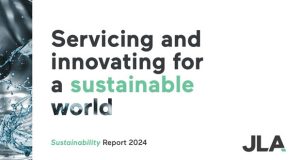Could using the latest smart technology to offer an Uber-style response service revolutionise the way the FM industry manages reactive services? Do you agree that service capabilities and costs would be transformed if FM services suppliers completely digitalised their processes and created their own Uber-style network of overlapping local service providers? How will this affect them and the organisations they support?
 THE SMART TECHNOLOGY INNOVATOR’S VIEW
THE SMART TECHNOLOGY INNOVATOR’S VIEW
JASON MOHR,
FOUNDER AND MD OF ANYJUNK
I really don’t think it is a question of ‘if’, but ‘when’ an Uber style company emerges in the FM reactive services space. Although, to be clear, I am not referring to a gig economy platform. But a company similar in nature to AnyJunk that uses App based technology to partner with a national network of overlapping local service businesses. There are more than enough local businesses capable of providing services to a perfectly acceptable standard – they just need the technology and processes to leverage that resource to deliver an effective nationwide solution.
The commercial attractions of such a business model are compelling. Super flexible capacity for a fraction of the overhead and managerial headache that a traditional in-house team requires. Plus, the ability to offer customers a faster, more reliable service without the need to charge a premium. Combine this with a properly digitalised and lean operational infrastructure, and costs to serve the customer will actually fall. As a business owner, what’s not to love?
Equally, for the underlying local service providers – surely they would also embrace such a platform? Extra work (often from large underlying corporate accounts they would not normally get a chance to serve) on their doorstep that they can pick and choose from depending on their other jobs and available resource for that day. In other words the perfect client!
For customers – they receive a better service (faster response and improved reliability) without any premium. And, as the platform business scales and jobs per miles and resource optimisation improve, prices should actually fall.
Last but not least, from a sustainability perspective – by taking national in-house fleets off the road and connecting work to the nearest local service provider, the model reduces carbon emissions and congestion. In addition, it channels local spend back into local communities.
So, given these obvious advantages, why hasn’t it happened? First is the technology – it costs money, takes time to build, and you need people who understand how to build and use it. Second is the need to have enough customer demand from day one to attract and engage a national network of service providers. Personally, I cannot see a start-up making much headway because they will struggle to attract commercial customers without a track record, and engaging suppliers without customers is practically impossible. The obvious source therefore is an existing player, with the client base and financial strength to make it happen and the bravery to reinvent their business model before one of their competitors does. But digital transformation is scary, there are a lot of internal politics to overcome, and speed of execution is a challenge with a large corporate. Nonetheless, as more and more sectors migrate to platform models, the strategic rationale will become more obvious, risk perception will reduce, and someone is bound to make the move.
 THE PROPERTY SERVICES PROVIDER’S VIEW
THE PROPERTY SERVICES PROVIDER’S VIEW
STEVE MCGREGOR,
GROUP MD DMA GROUP
Yes and no. Yes, using the latest smart technology – and, more importantly, using it well – will revolutionise the way the FM profession manage reactive services. But, no, we’re not convinced that a purely replicated Uber model would work. Unlike Uber, the FM journey is much more complex than getting from A to B. It rarely takes a direct route and may not stop at B.
When you look at the Uber model, it’s very simplistic. A customer accesses the app and, bingo, they’re wherever they need to be. In FM, there’s a whole array of pretty significant variables to consider. As such, we think it’s doubtful that we’d get to the point where the current Uber model would be achievable, but there are components that can be introduced now by those organisations already using smart field technology.
One of the benefits of smart tech – and the transparency that comes with it – is knowing you’re getting exactly what you pay for. With Uber, there’s something comforting about knowing who your driver is, how they’ve been rated, where they are, what route they’re taking, and how much it’s going to cost… all before the car even appears. If we adopt a similar model in FM, well, it could be a huge benefit. By the same token, it could involve quite a bit of work for the occupier… unless they use a partner that does it for them.
Automating processes so an FM offering can move from ‘planned’ to ‘reactive’ is definitely in the industry’s interest. Offering customers more flexibility and choice when it comes to how they engage and manage their service provider(s) or inhouse FM teams is also a bonus. Digitalising the supply chain would enable customers to get closer to the person delivering the service. It will also promote best practice and consistency across independent service providers. Uber drivers get rated after every journey. Imagine the difference it would make if FM customers could issue 5 stars for excellent service, or 1 star for the opposite!
Contracts could be a thing the past, too. Instead of signing up to a three-year agreement, with set service level parameters and KPIs, organisations could simply engage with a contractor as and when they need to.
Those are the good facets of Uber’s model. Transparency, choice, flexibility, convenience. But, alas, life’s not a utopian dream. Considering that facilities and property management requires many different ‘drivers’ all going in different directions at different times, so the time, effort and resource required to constantly find and manage service engineers with the relevant experience, competence and expertise would perhaps dilute the excitement of the supposed benefits if not fully automated.
People who operate buildings and facilities have a lot on the line. There’s the health and safety of occupants on their shoulders, not to mention the operational aspects. FMs want stuff done by people they trust. An Uber-style model offers a much more fleeting, one-dimensional engagement with those who are ‘in and out’ with every job done. The ‘next, next, next’ mentality of the Uber model could remove the heart of what FM’s about – relationships. There’s definitely mileage in the Uber model but let’s plan the route carefully.




